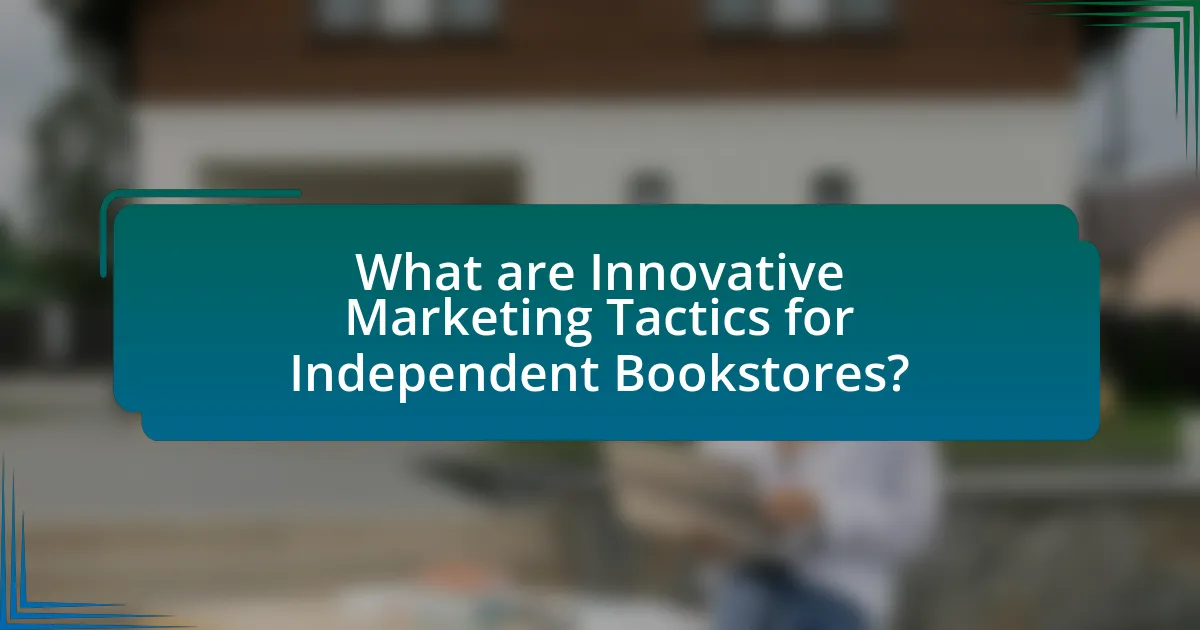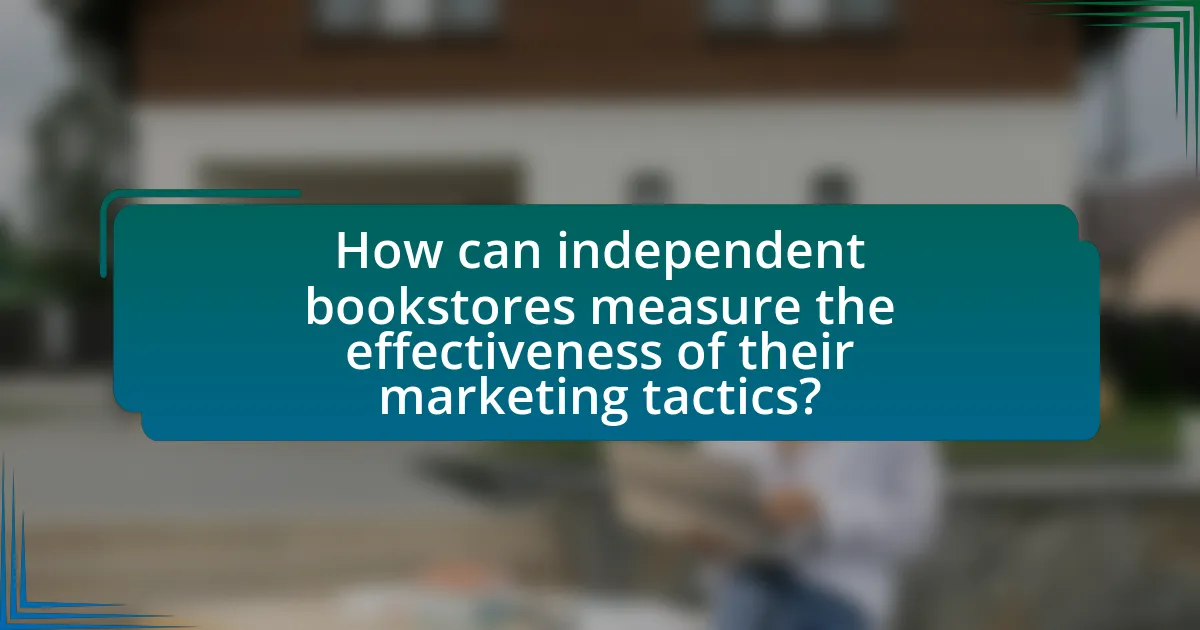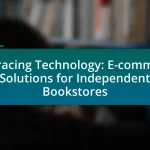The article focuses on innovative marketing tactics for independent bookstores, emphasizing strategies such as community events, social media engagement, and personalized customer experiences. It contrasts these approaches with traditional marketing methods, highlighting the importance of local engagement and tailored experiences in fostering customer loyalty. The article also addresses the unique challenges independent bookstores face, including limited budgets and competition from online retailers, and discusses how innovative tactics can effectively overcome these obstacles. Additionally, it outlines the significance of measuring marketing effectiveness through sales data and customer feedback, while providing practical tips for successful marketing implementation.

What are Innovative Marketing Tactics for Independent Bookstores?
Innovative marketing tactics for independent bookstores include hosting community events, utilizing social media for engagement, and creating unique in-store experiences. Community events, such as author readings and book clubs, foster local engagement and build a loyal customer base. Social media platforms like Instagram and Facebook allow bookstores to showcase new arrivals, promote events, and interact with customers, which can increase foot traffic and online sales. Additionally, offering personalized recommendations and themed displays enhances the shopping experience, encouraging customers to explore and purchase more. These tactics have been shown to effectively increase visibility and sales for independent bookstores in a competitive market.
How do these tactics differ from traditional marketing strategies?
Innovative marketing tactics for independent bookstores differ from traditional marketing strategies primarily in their focus on community engagement and personalized experiences. Traditional marketing often relies on broad, one-size-fits-all approaches such as mass advertising and generic promotions, while innovative tactics emphasize local partnerships, social media interaction, and tailored events that resonate with specific customer interests. For instance, independent bookstores may host author readings or community book clubs, fostering a sense of belonging and loyalty among customers, which is less common in traditional marketing. This shift towards experiential and relationship-based marketing has been shown to increase customer retention and satisfaction, as evidenced by studies indicating that businesses engaging in community-oriented strategies see a 20% higher customer loyalty rate compared to those relying solely on traditional methods.
What unique challenges do independent bookstores face in marketing?
Independent bookstores face unique challenges in marketing primarily due to limited budgets and resources compared to larger retailers. These financial constraints restrict their ability to invest in extensive advertising campaigns, digital marketing, and promotional events that could enhance visibility and attract customers. Additionally, independent bookstores often struggle with competition from online giants like Amazon, which can offer lower prices and faster delivery, making it difficult for local shops to retain customer loyalty. According to a 2021 survey by the American Booksellers Association, 70% of independent bookstores reported that competition from online retailers significantly impacts their sales. Furthermore, independent bookstores may lack the technological expertise to effectively utilize social media and e-commerce platforms, hindering their ability to reach a broader audience.
How can innovative tactics address these challenges?
Innovative tactics can address the challenges faced by independent bookstores by leveraging technology and community engagement to enhance customer experience and increase sales. For instance, implementing personalized marketing strategies through data analytics allows bookstores to tailor recommendations to individual customers, thereby improving customer satisfaction and loyalty. A study by the American Booksellers Association found that personalized outreach can increase customer retention rates by up to 30%. Additionally, utilizing social media platforms for interactive events, such as virtual author readings or book clubs, fosters a sense of community and drives foot traffic to physical locations. This approach not only enhances customer engagement but also creates a unique selling proposition that differentiates independent bookstores from larger retailers.
Why is innovation important in marketing for independent bookstores?
Innovation is important in marketing for independent bookstores because it enables them to differentiate themselves in a competitive market dominated by large retailers and online platforms. By adopting innovative marketing strategies, such as personalized customer experiences, unique events, and community engagement initiatives, independent bookstores can attract and retain customers. For instance, a study by the American Booksellers Association found that independent bookstores that implemented creative marketing tactics saw a 20% increase in foot traffic and sales. This demonstrates that innovation not only enhances visibility but also fosters customer loyalty, which is crucial for the sustainability of independent bookstores.
What trends are influencing the need for innovative marketing?
The trends influencing the need for innovative marketing include the rise of digital technology, changing consumer behavior, and increased competition. Digital technology has transformed how consumers interact with brands, necessitating innovative strategies to engage audiences effectively. For instance, 79% of consumers prefer personalized experiences, highlighting the demand for tailored marketing approaches. Additionally, the shift towards online shopping has accelerated, with e-commerce sales growing by 44% in 2020 alone, prompting businesses to adopt innovative online marketing tactics. Furthermore, the competitive landscape has intensified, with independent bookstores facing challenges from large retailers and online giants, driving the need for unique marketing solutions to differentiate themselves.
How does consumer behavior impact marketing strategies?
Consumer behavior significantly impacts marketing strategies by influencing how businesses tailor their offerings and communication to meet customer needs. For instance, understanding that consumers increasingly prefer personalized experiences leads independent bookstores to implement targeted marketing campaigns, such as personalized book recommendations based on past purchases. Research indicates that 80% of consumers are more likely to make a purchase when brands offer personalized experiences, highlighting the importance of aligning marketing strategies with consumer preferences. Additionally, consumer behavior trends, such as the rise of online shopping, compel bookstores to enhance their digital presence and utilize social media platforms for engagement, thereby adapting their marketing strategies to remain competitive in a changing market landscape.

What are some examples of Innovative Marketing Tactics?
Innovative marketing tactics for independent bookstores include hosting community events, utilizing social media for engagement, and implementing personalized customer experiences. For instance, community events such as book readings or local author signings foster a sense of belonging and attract foot traffic, which can increase sales. Social media platforms like Instagram and Facebook allow bookstores to showcase new arrivals and engage with customers through interactive content, leading to higher brand visibility. Personalized customer experiences, such as tailored book recommendations based on previous purchases, enhance customer loyalty and satisfaction, as evidenced by studies showing that personalized marketing can increase sales by up to 20%.
How can social media be leveraged for independent bookstores?
Independent bookstores can leverage social media by creating engaging content that showcases their unique offerings and fosters community interaction. By utilizing platforms like Instagram and Facebook, bookstores can share visually appealing images of new arrivals, host virtual author events, and promote book clubs, which can attract a wider audience. Research indicates that 73% of marketers believe that their efforts through social media marketing have been “somewhat effective” or “very effective” for their business (Buffer, 2021). This demonstrates the potential impact of social media on driving foot traffic and online sales for independent bookstores.
What platforms are most effective for bookstores?
Social media platforms, particularly Instagram and Facebook, are the most effective for bookstores. These platforms allow bookstores to engage with their audience through visually appealing content, promotions, and community-building activities. For instance, Instagram’s visual nature enables bookstores to showcase book covers, events, and store aesthetics, which can attract potential customers. According to a 2021 survey by the American Booksellers Association, 70% of independent bookstores reported that social media significantly contributed to their marketing success. Additionally, Facebook’s event features help bookstores promote author signings and community events, further enhancing customer engagement and foot traffic.
How can bookstores create engaging content on social media?
Bookstores can create engaging content on social media by sharing visually appealing book displays, hosting live readings, and promoting community events. These strategies attract followers and encourage interaction, as studies show that posts with images receive 94% more views than text-only posts. Additionally, engaging content such as polls about favorite books or author Q&A sessions fosters community involvement and enhances customer loyalty. By consistently posting diverse content that resonates with their audience, bookstores can effectively increase their online presence and customer engagement.
What role do community events play in marketing?
Community events serve as a vital marketing tool for independent bookstores by fostering local engagement and building brand loyalty. These events create opportunities for bookstores to connect directly with their target audience, enhancing visibility and establishing a community presence. For instance, hosting author readings or book clubs can attract local customers, leading to increased foot traffic and sales. According to a study by the American Booksellers Association, 70% of independent bookstores reported that community events significantly contributed to their overall sales growth. This demonstrates that community events not only enhance customer relationships but also drive economic benefits for independent bookstores.
How can bookstores organize successful events?
Bookstores can organize successful events by carefully planning and promoting activities that engage their target audience. This includes selecting relevant themes, inviting local authors or speakers, and creating interactive experiences such as book signings or readings. Research indicates that events featuring local authors can increase foot traffic by up to 30%, as they attract community interest and foster a sense of local pride. Additionally, effective marketing strategies, such as utilizing social media platforms and email newsletters, can enhance visibility and attendance. By leveraging partnerships with local businesses and organizations, bookstores can further amplify their reach and create a collaborative community atmosphere, which is essential for successful event execution.
What types of events resonate most with local audiences?
Local audiences resonate most with community-focused events, such as author readings, book signings, and literary festivals. These events foster a sense of belonging and connection among attendees, as they often feature local authors or themes relevant to the community. Research indicates that 70% of consumers prefer to attend events that highlight local culture and talent, reinforcing the importance of community engagement in event planning for independent bookstores.

How can independent bookstores measure the effectiveness of their marketing tactics?
Independent bookstores can measure the effectiveness of their marketing tactics by analyzing sales data, customer feedback, and engagement metrics. Sales data provides a direct correlation between marketing efforts and revenue changes, allowing bookstores to identify which campaigns drive sales. Customer feedback, collected through surveys or social media interactions, offers insights into customer perceptions and preferences, helping bookstores refine their strategies. Engagement metrics, such as website traffic, social media interactions, and email open rates, quantify the reach and impact of marketing initiatives. For instance, a study by the American Booksellers Association found that targeted email campaigns can increase customer engagement by up to 20%, demonstrating a clear link between marketing tactics and customer response.
What metrics should bookstores track to evaluate success?
Bookstores should track sales revenue, customer foot traffic, inventory turnover, and customer retention rates to evaluate success. Sales revenue indicates overall financial performance, while customer foot traffic measures the effectiveness of marketing efforts in attracting visitors. Inventory turnover reflects how efficiently a bookstore sells its stock, and customer retention rates provide insight into customer loyalty and satisfaction. According to the American Booksellers Association, independent bookstores that actively monitor these metrics can make informed decisions that enhance profitability and growth.
How can customer feedback be utilized in measuring effectiveness?
Customer feedback can be utilized in measuring effectiveness by analyzing customer satisfaction levels and identifying areas for improvement. Independent bookstores can collect feedback through surveys, reviews, and direct interactions, allowing them to gauge customer perceptions of their services and products. For instance, a study by the American Booksellers Association found that 70% of customers who provided feedback reported a higher likelihood of returning if their suggestions were implemented. This data demonstrates that effectively responding to customer feedback not only enhances customer loyalty but also improves overall business performance.
What tools are available for tracking marketing performance?
Tools available for tracking marketing performance include Google Analytics, HubSpot, and Hootsuite. Google Analytics provides insights into website traffic and user behavior, allowing marketers to assess the effectiveness of their online campaigns. HubSpot offers comprehensive marketing analytics, including email performance and lead tracking, which helps businesses understand customer engagement. Hootsuite enables social media performance tracking, providing metrics on post engagement and audience growth. These tools are widely used in the industry, with Google Analytics reporting over 29 million active users, demonstrating their effectiveness in measuring marketing performance.
What are some common pitfalls to avoid in innovative marketing?
Common pitfalls to avoid in innovative marketing include neglecting audience research, failing to measure campaign effectiveness, and overcomplicating messaging. Neglecting audience research can lead to misaligned strategies that do not resonate with potential customers, resulting in wasted resources. Failing to measure campaign effectiveness prevents marketers from understanding what works and what doesn’t, hindering future improvements. Overcomplicating messaging can confuse consumers, making it difficult for them to grasp the value proposition, which can diminish engagement and conversion rates. These pitfalls can significantly undermine the success of innovative marketing efforts in independent bookstores.
How can bookstores ensure they stay true to their brand while innovating?
Bookstores can ensure they stay true to their brand while innovating by aligning new initiatives with their core values and customer expectations. For instance, if a bookstore emphasizes community engagement, it can innovate by hosting local author events or book clubs that reflect this commitment. Research shows that 70% of consumers prefer brands that share their values, indicating that maintaining brand integrity while innovating can enhance customer loyalty. By integrating customer feedback into their innovation strategies, bookstores can create offerings that resonate with their audience, ensuring that new ideas reinforce rather than dilute their brand identity.
What mistakes can lead to ineffective marketing campaigns?
Ineffective marketing campaigns often result from a lack of clear target audience identification. When independent bookstores fail to define who their ideal customers are, they risk creating messages that do not resonate, leading to low engagement and poor sales. For instance, a study by HubSpot found that companies with a clearly defined target audience are 60% more effective in their marketing efforts. Additionally, neglecting to utilize data analytics can lead to misguided strategies; without analyzing customer behavior and preferences, bookstores may miss opportunities to tailor their offerings effectively. Furthermore, inconsistent branding across platforms can confuse potential customers, diminishing brand recognition and loyalty. According to a report by Lucidpress, consistent branding can increase revenue by up to 23%. Lastly, failing to adapt to changing market trends can render campaigns obsolete, as consumer preferences evolve rapidly in the digital age.
What practical tips can independent bookstores implement for successful marketing?
Independent bookstores can implement community engagement events, such as author readings and book clubs, to enhance their marketing efforts. These events foster a sense of community and encourage customer loyalty, as they provide opportunities for readers to connect with authors and each other. According to a study by the American Booksellers Association, independent bookstores that host events see a significant increase in foot traffic and sales, with 70% of customers attending events making a purchase. Additionally, leveraging social media platforms to promote these events can further amplify reach and engagement, as 54% of consumers report being influenced by social media when making purchasing decisions.


